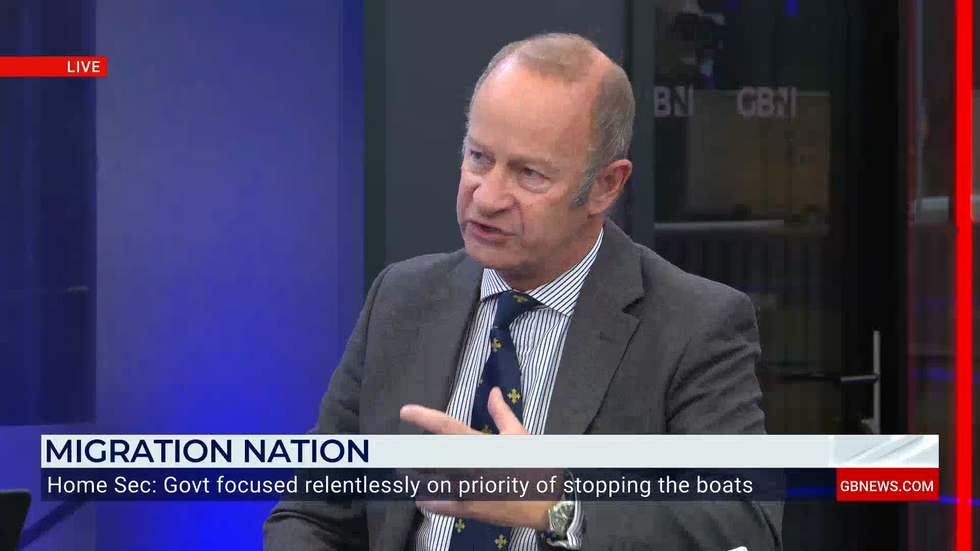It's time Britain had a mature response to the immigration crisis, says Henry Bolton
PA
The Former UKIP leader explains why it's time for a national task force to take serious action
Don't Miss
Most Read
Trending on GB News
The Government has repeatedly promised to stop the small boats that persist in crossing the Channel but has so far failed to do so. The Borders and Immigration Bill has had little to no impact, the Prime Minister’s much vaunted Rwanda plan has run into legal roadblock after legal roadblock and the Rwanda Bill, designed to overcome these roadblocks, has revealed deep divisions within the Conservative Party. It’s a political mess and the boats still come.
There is an answer to all of this, but first the Government must recognise that the Rwanda Plan, even if it is one day put into operation, will not deter Channel crossings.
What is needed is a comprehensive and properly integrated national strategy. Indeed, it’s mind boggling that such a thing does not yet exist. That strategy must integrate all efforts relating to the management and securing of our land, maritime and air borders, and all related efforts at the international, regional (European), national and local levels. A National Borders Working Group must be established, chaired by a National Borders Coordinator reporting to the Prime Minister and comprised of the chairs of subordinate working groups in all involved departments and agencies (at least 15 of them).
The National Working Group must undertake a comprehensive assessment of all challenges and risks at our borders: trade facilitation, immigration and the safe and secure movement of passengers, narcotics illegal firearms, people smuggling, human trafficking, fisheries protection, phyto-sanitary and public health risks, pollution control, strategic resilience etc. It should include a full assessment of structures and organisations and the existing legal framework. On the basis of that assessment, the Group should draft a National Borders and Immigration Strategy and associated Implementation Plan. It would define clear objectives, allocate tasks and resources, identify any needs for structural, operational, legal or other reforms, training, set timelines, and establish a monitoring, reporting and strategy review and adjustment mechanism.
Elements that one should expect to see are actions to: 1) address the push factors for immigration, and the sources of illicit commodities 2) identify and dismantle organised crime groups along the entire trafficking routes 3) address the pull factors. Each of these is massively complex and, in other countries, such planning usually runs to between 90 and 280 pages.
There’s clearly a myriad of actions that have to be undertaken, but much of the media and the public have become fixated on just two things: how to stop boasts at sea in the Channel and, should we leave the European Convention on Human Rights? If push and pull factors and the criminal facilitation of movement are comprehensively addressed, there should be virtually no boats, and so the question of stopping them at sea becomes irrelevant, hence the fixation on what happens in the Channel is misguided.

Henry Bolton says it's time for a coordinated national response to the migrant crisis
GB News
But, nonetheless, as that fixation exists, let’s address these two questions.
It’s not difficult to stop a small boat. The overriding requirement to take control of it without endangering its occupants. This can be done in three stages: 1) foul the outboard motor of the boat, which can be done with the deployment of a nylon rope or net around the boat in question 2) Use a landing craft type vessel, with a front ramp, to ‘scoop up’ the small boat into its hold 3) once in the hold of the vessel, the occupants of the small boat must be secured. If the necessary political will can be established, the vessel could then simply drive onto a French beach and hand the occupants back to the French authorities, or just leave them on the beach. Such tactics would not violate the UN Convention on the Law of the Sea or it’s Safety of Lives at Sea protocol.
If we believe that our Parliament, as elected by the people, legislates and should not be beholden to, or constrained by, a foreign court that has grown way beyond its original concept and purpose and that operates according to the principles of codified – directive – law, rather than those of our own common law, we must leave the ECHR.
This would certainly ease the implementation of law as enacted by the UK Parliament. However, if such a move is to be seriously considered, it should be considered alongside a UK Bill of Rights that would reassure those who are rightly concerned to ensure continued protection of human rights and freedoms here in the UK.
There is no single silver bullet or deterrent when it comes to stopping the boats or addressing the unsustainable and destabilising levels of immigration. Instead, there are numerous measures that must be taken concurrently and in coordination, as part of a truly coordinated and cross-governmental team effort. That in turn requires leadership, strategy, thorough planning and the allocation of adequate resources. Above all it requires the political will to make it happen. Do any of these things exist at present? Sadly not.
You may like




